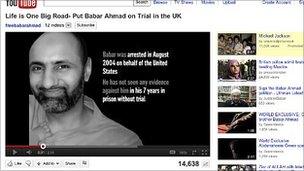Babar Ahmad campaign's anger at e-petition 'disrespect'
- Published

Babar Ahmad: Campaign online by family
Supporters of a man fighting extradition to the US over terrorism allegations say they have been treated with "disrespect" by the government.
An e-petition to put Babar Ahmad on trial in the UK attracted 140,000 signatures - surpassing the threshold to be considered for a Commons debate.
But a Commons committee says it will be included in a wider extradition debate in Westminster Hall, without a vote.
Campaigner Fahad Ansari said he felt the e-petition had been "dismissed".
Babar Ahmad has been held without charge for seven years and is challenging extradition to the United States - which alleges that he was responsible for a global fundraising campaign for extremists in Afghanistan and Chechnya through a website operated from south London but technically based in the US.
He is also accused of having obtained information about US Navy ships and their movements in the Gulf. He denies the allegations and the campaign run by his family has attracted some celebrity support from the boxer Amir Khan and comedian Mark Thomas.
'Makes no difference'
Mr Ansari, from the Free Babar Ahmad campaign, told BBC Radio 4's World at One: "There is an assurance on the petition website saying this is a way for the public to influence government policy, for them to suddenly dismiss it in this manner and say: 'You will have your discussion in Westminster Hall', which anybody who knows anything about politics knows makes no difference whatsoever to the issue.
"It just shows the level of disrespect which the government has shown to 141,000 people."
The government's e-petitions website, external allows topics which attract 100,000 signatures to be considered by the Backbench Business Committee of MPs, which controls some of the Commons timetable, for a debate.
Several e-petitions have passed the threshold and prompted full Commons debates - including one urging full disclosure of all government documents relating to the 1989 Hillsborough disaster, another urging the government to scrap a planned rise in fuel duty and another on whether the UK should hold a referendum on its EU membership.
But the first e-petition to pass the 100,000 threshold, calling for those involved in the summer riots to lose their entitlement to state benefits, saw a wider three-hour debate in Westminster Hall on the riots - without mentioning benefits.
Backbench Business Committee chairman Natascha Engel said there was a "real danger" that people were being given a false expectation about what would happen when a petition hit 100,000 signatures.
Commons leader Sir George Young told the BBC that the fact that 2.6m people had signed e-petitions showed they were "helping to build a bridge between Parliament and people" and had generated some good debates - including the one on Hillsborough which he described as "one of the best debates we have had in this Parliament".
But he said the whole e-petitions programme was part of a strategy in which the government was trying to hand power back to Parliament - and it was up to the Backbench Business Committee to decide whether e-petitions got debated in the Commons chamber or Westminster Hall, and whether it was a debate with a "substantive motion".
He added: "It would be quite wrong if it was the government to set the motions for these e-petitions."
He also denied that the current 100,000 threshold was causing problems and said it was not being reviewed "at the moment".
- Published3 November 2011
- Published4 August 2011
- Published24 February 2012
- Published22 June 2011
- Published8 September 2010